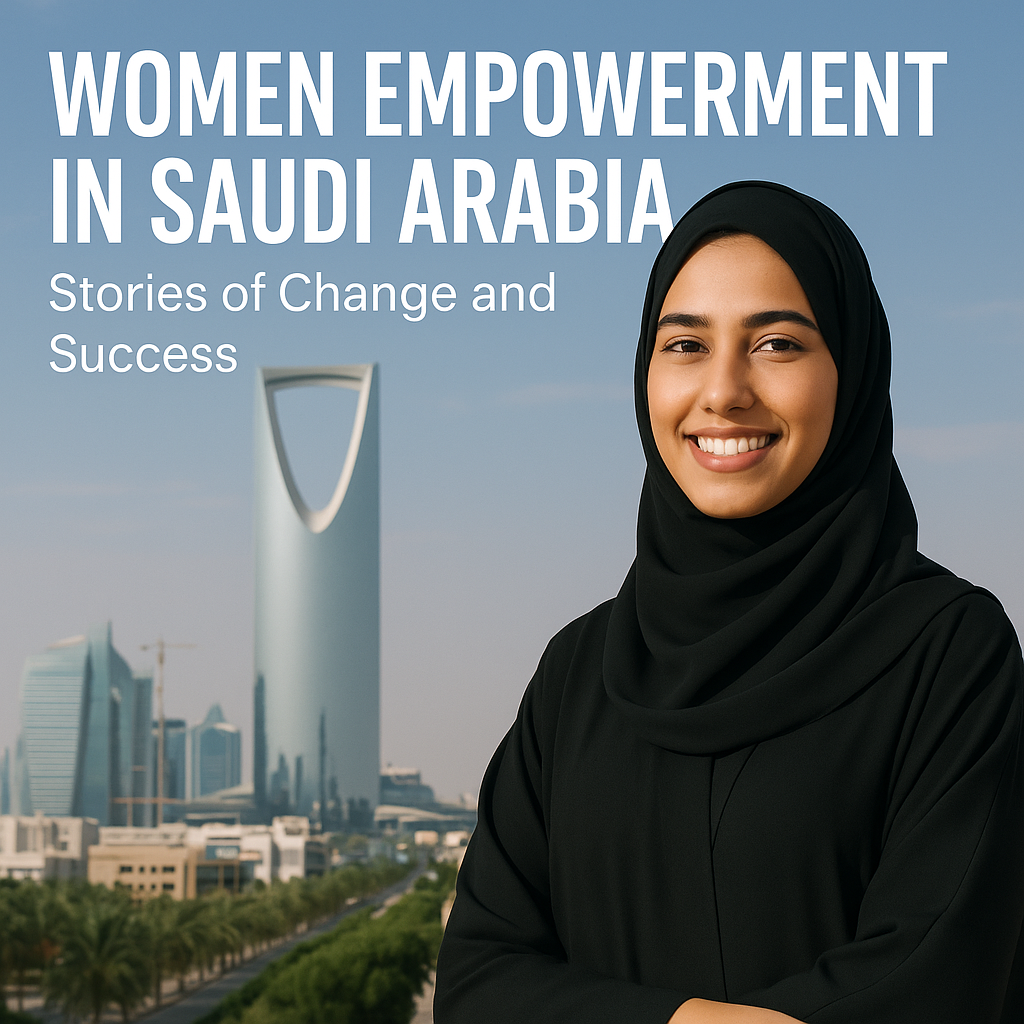Over the past decade, Saudi Arabia has undergone a transformative journey toward women empowerment, reshaping societal norms and creating unprecedented opportunities for Saudi women. Driven by Vision 2030, the Kingdom’s roadmap for economic diversification and social progress, Saudi women are stepping into leadership roles, excelling in various industries, and contributing significantly to national development.
Today, Saudi women are not only participating in the workforce but are also leading companies, founding startups, and representing the nation on global platforms. This article explores the success stories, policy changes, and the ongoing transformation that make women empowerment in Saudi Arabia a beacon of change in the Middle East.
The Role of Vision 2030 in Women Empowerment
Launched in 2016, Vision 2030 aims to diversify Saudi Arabia’s economy and promote social inclusion. A core pillar of this vision is enhancing women’s participation in the workforce. The government set ambitious targets to increase female workforce participation from 22% to 30% by 2030, a milestone that was achieved ahead of schedule in 2022.
Key reforms under Vision 2030:
- Driving Rights: In 2018, Saudi Arabia lifted the ban on women driving, symbolizing greater autonomy.
- Workplace Integration: Laws now ensure equal pay and protect against workplace discrimination.
- Entrepreneurship Support: Saudi women can now easily start businesses without requiring a male guardian’s approval.
These policy changes reflect Saudi Arabia’s commitment to fostering an inclusive society where women can contribute fully.
Breaking Barriers: Saudi Women Leading the Way
1. Sarah Al-Suhaimi – Financial Trailblazer
Sarah Al-Suhaimi made history as the first female Chairperson of the Saudi Stock Exchange (Tadawul). Her leadership in the financial sector reflects a broader inclusion of women in high-profile positions traditionally dominated by men. Under her guidance, Tadawul played a pivotal role in the Saudi Aramco IPO, the world’s largest public offering.
2. Raha Moharrak – Conquering Mount Everest
Raha Moharrak broke stereotypes by becoming the first Saudi woman to summit Mount Everest. Her achievement has inspired countless Saudi women to pursue adventure sports and push personal boundaries. Moharrak’s story exemplifies how Saudi women are expanding their horizons, both literally and figuratively.
3. Haifa Al-Mogrin – Champion of Global Development
Appointed as Saudi Arabia’s Permanent Representative to UNESCO, Haifa Al-Mogrin has represented the Kingdom on global cultural and educational platforms. Her role demonstrates Saudi Arabia’s commitment to cultural diplomacy and international cooperation, with women playing central roles.
Key Sectors Witnessing Women’s Empowerment
1. Business and Entrepreneurship
Saudi Arabia has witnessed a surge in female entrepreneurship, with more than 45% of small and medium enterprises (SMEs) now owned by women. Government initiatives like the Monsha’at program and financial grants support women entrepreneurs across industries.
Notable Example:
- Leila Albarakati, founder of Senso, a smart wearable tech startup, is redefining healthcare technology in the region.
2. Education and Research
Saudi women represent 60% of university graduates, outpacing men in several disciplines such as science, technology, engineering, and mathematics (STEM).
Key Milestones:
- The Princess Nourah Bint Abdulrahman University in Riyadh is the largest women-only university in the world.
- Saudi female scientists like Dr. Hayat Sindi, a biotechnology leader, contribute to global scientific research and innovation.
3. Sports and Entertainment
Following policy reforms, Saudi women athletes have participated in international competitions and have launched local sports leagues.
Recent Highlights:
- In 2022, Saudi Arabia established the first national women’s football team.
- Saudi women now compete in Olympic events, representing the Kingdom globally.
Entertainment has also seen the rise of female filmmakers, actors, and producers contributing to Saudi cinema. The Red Sea International Film Festival showcases the creative talents of Saudi women in filmmaking.
Government Initiatives Fueling Change
The Saudi government continues to launch initiatives aimed at empowering women:
1. Qiyadat Global – Saudi Women’s Leadership Program
A leadership development program in collaboration with Harvard University, it trains Saudi women to take on executive roles in the private and public sectors.
2. Tamheer and Hadaf Programs
Designed to support female employment, these initiatives provide training, mentorship, and subsidies to encourage companies to hire and promote Saudi women.
3. Women in Vision 2030
This initiative highlights women’s achievements aligned with the Vision 2030 goals, providing networking platforms and global exposure.
Cultural Shift and Global Perception
The empowerment of Saudi women is not only a policy-driven agenda but also a societal shift. Saudi media, social platforms, and educational campaigns foster new narratives about women’s roles.
Global recognition:
- Saudi Arabia improved its ranking in the World Bank’s “Women, Business and the Law” report, recognizing reforms in workplace protections and mobility rights.
- International partnerships with organizations such as UN Women amplify Saudi women’s voices on the global stage.
Challenges and the Road Ahead
While remarkable progress has been made, challenges remain:
- Workforce integration: Cultural barriers in certain regions and industries still affect female participation.
- Representation in leadership: More efforts are needed to ensure greater female presence in boardrooms.
However, with continued policy support, educational advancements, and changing societal attitudes, Saudi Arabia is poised to achieve greater gender parity.
Conclusion: A Transformational Journey
The empowerment of women in Saudi Arabia is one of the most transformative stories of the 21st century. From the boardrooms of Riyadh to the summits of Everest, Saudi women are proving that barriers can be broken and new horizons can be reached.
Guided by Vision 2030, Saudi Arabia continues to foster an environment where women are leaders, innovators, and changemakers. The journey is ongoing, but the progress made so far is a testament to the Kingdom’s commitment to inclusivity and sustainable development.
Stay tuned to SaudiNews.de for more inspiring stories, latest updates, and exclusive interviews that highlight how Saudi women are shaping the future.


Leave a Reply